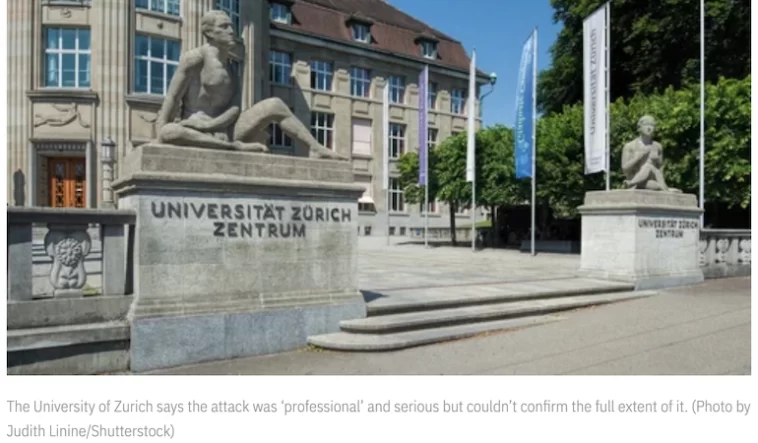It is the latest attack on German-speaking institutions to target Switzerland’s largest university.Earlier this week, one of the biggest universities in Switzerland was hacked, the latest in a series of hacks targeting German-speaking institutions.
Following the attack on the university’s website earlier today, which led to the website being taken offline, the university says it’s unaware that any data was encrypted or extracted by the attackers. The IT services are continuing to run as normal.
The University of Zurich is the largest, with more than 25,000 students and 3,700 staff across several city campuses. According to the university, its security measures have been strengthened. They have described the attack as “extremely professional” and “serious,” although no damage has been done.
Students and staff have been urged to change their passwords, and the university has called on external support to make it harder for the malware to spread over the network. Even though the attack does not appear to have been affected by the IT infrastructure, officials assure that at any time, if the situation deteriorates, “individual or comprehensive restrictions on services are to be expected for security reasons.”
Several attacks have recently been launched on universities and health institutions in German-speaking countries, including an attack on a German-speaking university. One of these attacks was the ransomware attack on the University of Duisburg-Essen carried out by the Vice Society ransomware group in November last year.
EUFH and Harz Universities of Applied Sciences were the two most recent institutions hit by ransomware attacks. Neither of these attacks nor the one that hit the University of Zurich has been claimed as the work of a particular group. As for why there has been an escalation in the number of attacks, it is not clear if there is a reason for it.
Higher education institutions in different parts of the world are being attacked more and more in recent times, including in the UK, where Jisc. This not-for-profit company that sells education IT services has recently released new guidelines for improving the security of the university networks it runs.
There has been an increase in attacks against the education sector worldwide. According to John Chapman, Jisc director of information security policy, these attacks devastate the education sector. As long as organizations are willing to accept the higher risk of a serious cybersecurity incident, they can opt-out if they wish restrictions on specific IP addresses, they can still opt out of the restrictions.


